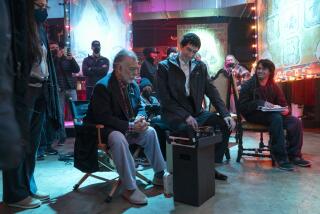Trojan horse is movies’ new ride
- Share via
The ads began surfacing in the Home and Food sections of some 30 newspapers across the country last week. Nestled among commercial pitches for sofas or restaurants were photos of divorce attorney Audrey Woods beneath the words “I’m Not a Shark.” Almost immediately, complaints began flowing in to lawyers’ groups like the Illinois Attorney Registration and Disciplinary Commission seeking to discipline Woods for not listing her law license.
Perception? Just another divorce attorney looking for clients. Reality? A highly refined movie ad featuring actress Julianne “I’m Not a Shark” Moore, who stars as a divorce attorney in the upcoming romantic comedy “Laws of Attraction.”
This Trojan horse approach to advertising appears to be Hollywood’s latest selling technique, with studios disguising movie ads as commercials for fictional products and services. The dupe factor has hardly proven a negative yet. “All’s fair in love and marketing,” says Nick Hamm, director of “Godsend,” which has its own movie-ad-disguised-as-infomercial out there
The strategy, say many studio executives, is nothing more than a pragmatic reaction to the heightened competition when the volume of films flooding the cineplex is at an all-time high. And there are usually clues embedded in the ads to alert consumers to the farce. In this case, logging on to the website listed on the ad for the attorney’s firm, katzcohenphelps.com, reveals her true corporate affiliation -- with New Line Cinema.
“It was a little controversial, perhaps,” Russell Schwartz, president of domestic theatrical marketing for New Line, says of the campaign, which is running in the Los Angeles Times among other publications. “But if you read the fine print, you’ll see that it’s a movie ad -- one that struck a chord with the public.”
Flashy, bombastic movie trailers cobbled together from existing footage are such a standard practice they verge on cliche. This new approach is “all about generating conversation,” Schwartz adds.
The blueprint for the current crop of fictional film ads was laid out in March with Focus Features’ “infomercial” for the Jim Carrey movie “Eternal Sunshine of the Spotless Mind.” The trailer opened with this disclaimer: “The following is a paid advertisement from Lacuna Inc. The views expressed do not reflect the opinions of the management of this theater.”
What followed was a testimonial by Dr. Howard Mierzwiak -- the movie’s Tom Wilkinson -- who goes on to promote his “safe, effective technique for the erasure of troubling memories.”
“The idea was to wake people up in the theater,” says Focus Features’ president of marketing, David Brooks. “Throw ‘em for a loop, disorient them a little, then bring Jim Carrey in in the middle of it, reacting like we hope the audience will react. His first question is, ‘This is a hoax, right?’ ”
Not everyone gets to that question right away. A website for Lions Gate Films’ coming clone thriller “Godsend” has generated a fair amount of controversy as well as more traditional buzz for the film, which lands in theaters Friday. Until last week, when several new links were added, the remarkably realistic www.godsendinstitute.org presented itself as a fertility clinic called the Godsend Institute. In lieu of streaming trailers or photos of the film’s stars, Rebecca Romijn-Stamos and Greg Kinnear, the website detailed the breakthrough medical procedure of the institute’s founder, Dr. Richard Wells -- Robert De Niro’s character in the film -- a specialist who offers “the replication of cells for the purpose of creating life from life.” It also provided a toll-free telephone number to call to make an appointment with Wells.
“We’re getting hundreds of phone calls -- a few from people who left messages saying they wanted information about having a loved one cloned,” Lions Gate President Tom Ortenberg says. “Those are the first calls we returned, to make sure people understand that it’s just a movie website. We didn’t mean to confuse anyone.
“We felt that if people went to the website not sure if it was real or fake, it would get ‘Godsend’ into the public vernacular -- that when people started seeing commercials for ‘Godsend’ the movie, they’d put it all together,” Ortenberg adds.
In Lions Gate’s case, they created a second bogus website designed to appear to be a protest to www.godsendinstitute.org. “We must put an end to the insanity of cloning, particularly cloning human beings,” the petition reads. A columnist for Ireland On-Line fell for the ruse, posting a story titled, “De Niro Cloning Movie Causes Outrage.”
“There’s so much clutter out there,” says Valerie Van Galder, executive vice president of marketing for Screen Gems. “When you’re in a bank with seven other trailers at the movie theater, you’re always trying to come up with unique things to breakthrough.”
A spoof infomercial for a product called Vapoorize -- a spray that atomizes dog mess, promising “no more poo worries” -- never explicitly mentions the movie “Envy,” which also lands Friday. But its charismatic pitchman, introduced as Nick Vanderpark, is actually “Envy’s” star, Jack Black.
With the Who’s “My Generation” playing in the background, a 30-second teaser trailer for the Will Smith movie “I, Robot,” due in theaters mid-July, masquerades as a commercial for the NS-5, an “automated domestic assistant” -- or servant robot. An ad for “The Stepford Wives,” another summer movie, takes the aspirational marketing approach. The camera lingers over expensive golf clubs, silk suits and designer shoes, before a voice-over asks, “Isn’t it time you had the ultimate in perfection?” and the ad cuts to the movie’s star, Nicole Kidman.
In each case, the trailers tie in to some fictional service or product that is featured in the movies: In “Envy,” Jack Black’s character becomes rich after inventing Vapoorize; in “I, Robot,” an army of NS-5s tries to overrun mankind, and so on.
Capitalizing on major theater chains’ increasingly common practice of showing up to 10 minutes of paid nonmovie advertisements before a movie begins, Screen Gems Films hired ace commercial director Marcus Nispel to produce a deliberately confusing commercial trailer for one of its upcoming films.
Onscreen, the movie audience watched a wrinkled old woman apply a skin cream called Regenerate to her face and magically morph into a beautiful young glamazon. “Imagine a world where you can reverse the effects of age, stress and sun,” the ad’s voice-over narrator coos. “Brought to you by the leading name in biotechnology ... the Umbrella Corp.,” it continues. “Now your youthful beauty can last ... forever.”
“At this point, people are hissing and booing,” Van Galder says. “Then, when the Umbrella Corp. part comes on, they realize: ‘It’s Resident Evil!’ ” The commercial is in reality a teaser trailer for “Resident Evil: Apocalypse,” this year’s sequel to 2002’s surprise hit in which the fictive Umbrella Corp. unleashes a noxious chemical that turns humans into zombies. “By the end, the audience was cheering,” Van Galder says. “It’s one of the most successful things that we’ve done.”
Of course, the irony in marketing movies this way underscores what movie trailers really are. “It’s like a commercial pretending to be a commercial when it is a commercial,” Van Galder says. “The snake eating its own tail.”
More to Read
The biggest entertainment stories
Get our big stories about Hollywood, film, television, music, arts, culture and more right in your inbox as soon as they publish.
You may occasionally receive promotional content from the Los Angeles Times.











